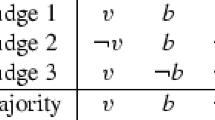Abstract
Judgment aggregation problems are language dependent in that they may be framed in different yet equivalent ways. We formalize this dependence via the notion of translation invariance, adopted from the philosophy of science, and we argue for the normative desirability of translation invariance. We characterize the class of translation invariant aggregation functions in the canonical judgment aggregation model, which requires collective judgments to be complete. Since there are reasonable translation invariant aggregation functions, our result can be viewed as a possibility theorem. At the same time, we show that translation invariance does have certain normatively undesirable consequences (e.g. failure of anonymity). We present a way of circumventing them by moving to a more general model of judgment aggregation, one that allows for incomplete collective judgments.
Similar content being viewed by others
References
Bovens, L., & Rabinowicz, W. (2004). Democratic answers to complex questions—an epistemic perspective. In M. Sintonen (Ed.), The socratic tradiction—questioning as philosophy and as method. Kluwer Academic Publishing.
Brams, S., & Fishburn, P. (1983). Approval voting. Birkhauser.
Dietrich F. (2006). Judgment aggregation: (Im)possibility theorems. Journal of Economic Theory 126(1): 286–298
Dietrich, F., & List, C. (2007). Judgment aggregation by quota rules. Journal of Theoretical Politics, 19(4), (in press).
Goodin R., List C. (2006). A Conditional defense of plurality rule: Generalizing May’s theorem in a restricted informational environment. American Journal of Political Science 50(4): 940–949
Leininger W. (1992). The fatal vote: Berlin versus Bonn. Finanzarchiv 50: 1–20
List C. (2005). Group knowledge and group rationality: A judgment aggregation perspective. Episteme 2(1): 25–38
List C., Pettit P. (2002). Aggregating sets of judgments: An impossibility result. Economics and Philosophy 18: 89–110
List C., Pettit P. (2004). Aggregating sets of judgments: Two impossibility results compared. Synthese 140(1–2):207–235
Miller D. (1974). Popper’s qualitative theory of Verisimilitude. The British Journal of the Philosophy of Science 25:166–177
Miller D. (1975). The accuracy of predictions. Synthese 30:159–191
Oddie, G. (2007). Truthlikeness. Edward N. Zalta (Ed.), The Stanford Encyclopedia of Philosophy (Summer 2007 Edition), http://plato.stanford.edu/archives/sum2007/entries/truthlikeness/.
Pigozzi G. (2006). Belief merging and the discursive dilemma: An argument-based account to paradoxes of judgment aggregation. Synthese 152(2): 285–298
Popper K. (1963). Conjectures and refutations. London, Routledge
Tichy P. (1974). On Poppers’s definitions of verisimillitude. The British Journal of the Philosophy of Science 25: 155–160
Zwart, S. (1998). Approaches to truth. Ph.D. thesis, ILLC Amsterdam.
Author information
Authors and Affiliations
Corresponding author
Rights and permissions
About this article
Cite this article
Cariani, F., Pauly, M. & Snyder, J. Decision framing in judgment aggregation. Synthese 163, 1–24 (2008). https://doi.org/10.1007/s11229-008-9306-x
Received:
Accepted:
Published:
Issue Date:
DOI: https://doi.org/10.1007/s11229-008-9306-x




